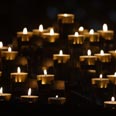
The mourning after
Op-ed: New immigrants to Israel who lost loved ones in war, terror attacks need our support
Israel is no stranger to terror and tragedy. Israelis are all too familiar with the sounds of sirens rushing through their streets, the anguish of the victims and their families. And when we deal with the trauma of terror or war, we know that as much as the physical wounds must heal, so too the emotional scars must be treated.
Yom Ha’Zikaron (Memorial Day) marks the day in which we remember our loved ones, snatched from us through wars and terrorism and we honor those who paid the ultimate price for the State of Israel. Israelis come together to mourn the loss of precious lives, torn families and devastated communities.
Israel is of course made up of many immigrants, who have made Aliyah in order to build their lives and homes in the Jewish State. These Olim adjust to their new lives in Israel with the help of government programs and non-profit organizations. Yet, in the absence of an established community - when tragedy strikes, unfamiliarity with Hebrew, Israeli culture, and a lack of extended family and friends can make the healing process so much more difficult for new immigrants, and on Yom Ha’Zikaron, these wounds are often painfully reopened.
They are left vulnerable and isolated.
At this year’s memorial ceremony at the Knesset, the official participants will include a representative of families who do not even live in Israel, yet have lost loved ones in terror attacks or while defending the State of Israel.
Strong support system needed
This year, Alexandra Shtiemer will be coming from Germany at the invitation of Israel’s National Insurance Agency, to pay her respects to the fallen. In 1993, Alexandra lost her only son, 32 year old Igor Gorgol, when he was murdered guarding a road construction site near Maale Adumim. Far from her son, and without extended family and friends for assistance, this is just one example of how sudden crisis can plunge individuals and families into a labyrinth of devastation and confusion.
Accordingly, since that terrible day, SELAH (the Israel Crisis Management Center) has been in close contact with Alexandra Shtiemer, escorting her to the funeral and assisting her both practically and emotionally to return for the setting of her son’s gravestone.
The scars and wounds inflicted by our enemies against our people remain for months, years, even decades after the event, and this is just one example of how help and support is needed in the long term – so much more so when the victims are unfamiliar with Hebrew Israeli culture, and without extended family and friends.
It must be remembered of course, that each situation differs vastly, and the coping skills of those affected may vary greatly from family to family and person to person. This means that the need for long term care must be met on an individual basis.
Accordingly, SELAH deals with each individual, providing the tailor-made care and support needed in response to the often life-changing consequences of such events.
The overriding message however, that we have seen first-hand, and the wider community must be aware of, is the need for a strong support system; a network of people who will step forward and help, providing emotional care and attention.
Isolation and vulnerability confound the damage caused by tragedies. By ensuring we are there, providing a network of support and in the long run, a community of survivors, we aim to heal and help rebuild.
As we dry our eyes after Yom Ha’Zikaron, the day gives way to the joy of Yom Ha’Atzmaut (Independence Day,) and we celebrate the re-establishment of the Jewish homeland. This process, together with the Holocaust memorial services held just a week earlier, reminds us that Israel was born to protect and shelter the Jewish people from exile.
We must therefore continue to celebrate but should never forget our purpose. The strength and bravery, and resilience of survivors of terrorism and wars, and that of their families can only strengthen the State of Israel. Perhaps no better example of this are the SELAH volunteers, many having themselves suffered personal tragedies, yet now give of themselves to help those in need.
The writer is Founder and Director of SELAH, the Israel Crisis Management Center (www.selah.org.il). SELAH is a member of the Israel Trauma Coalition
- Follow Ynetnews on Facebook










